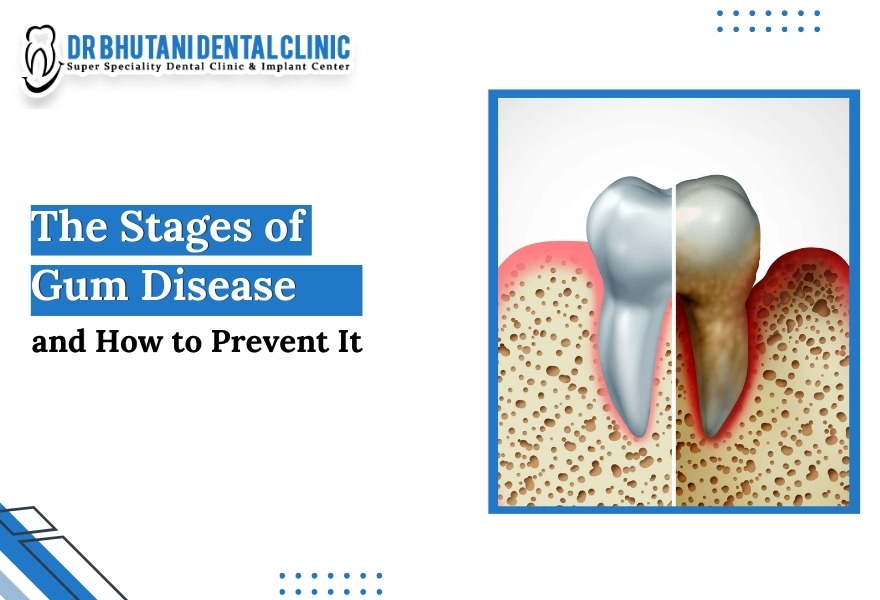
The Stages of Gum Disease and How to Prevent It?
Gum disease, also known as periodontal disease, is a common condition that affects the health of your gums and can lead to tooth loss if left untreated. Understanding the stages of gum disease and how to prevent it is essential for maintaining a healthy mouth. This blog will guide you through the stages of gum disease and offer effective prevention tips to help protect your oral health.
What is Gum Disease?
Gum disease is an infection of the tissues that support and surround your teeth. It usually starts with plaque, a sticky film of bacteria that forms on your teeth. When plaque isn’t properly removed, it can harden into tartar, leading to gum inflammation and more severe dental issues.
The Stages of Gum Disease
Gum disease progresses through various stages, each with its own symptoms and treatment options.
1. Gingivitis
Gingivitis is the earliest stage of gum disease and is caused by the accumulation of plaque on the teeth. The primary symptoms of gingivitis include:
- Red, swollen gums
- Bleeding when brushing or flossing
- Bad breath
At this stage, gum disease is reversible with proper oral hygiene and professional cleaning. Brushing twice a day, flossing daily, and regular dental visits can help eliminate plaque buildup and prevent gingivitis from progressing.
2. Early Periodontitis
If gingivitis is left untreated, it can advance to early periodontitis. In this stage, the infection begins to affect the bone supporting the teeth. Symptoms of early periodontitis include:
- Receding gums
- Persistent bad breath
- Slight bone loss
- Gum pockets forming around the teeth
At this stage, while the damage is more significant, it is still manageable with deep cleaning treatments like scaling and root planing. Your dentist may recommend more frequent visits to monitor and treat the disease.
3. Moderate Periodontitis
Moderate periodontitis occurs when the infection has spread deeper into the bone and tissues supporting the teeth. Symptoms may include:
- Increased gum recession
- Loose teeth
- Moderate bone loss
- More noticeable gum pockets
In this stage, the damage is more extensive and may require a combination of deep cleaning, medication, and potentially surgical intervention. Your dentist may suggest more advanced periodontal treatments to manage the infection and protect your teeth.
4. Advanced Periodontitis
The final stage of gum disease is advanced periodontitis, where severe damage has occurred to both the gums and the supporting bone structure. Symptoms of advanced periodontitis include:
- Significant tooth mobility
- Pain while chewing
- Severe gum recession
- Extensive bone loss
- Tooth loss
Advanced periodontitis may require surgical treatment such as bone grafting, gum tissue regeneration, or tooth extraction. If left untreated, this stage of gum disease can lead to complete tooth loss and a significant impact on your overall oral health.
How to Prevent Gum Disease
Prevention is the key to maintaining healthy gums and avoiding the progression of gum disease. Here are some effective ways to prevent gum diseases:
1. Practice Good Oral Hygiene
- Brush Twice a Day: Use a soft-bristled toothbrush and fluoride toothpaste to brush for at least two minutes.
- Floss Daily: Flossing helps remove plaque from areas your toothbrush can’t reach, such as between teeth and along the gum line.
- Use Mouthwash: Antimicrobial mouthwash can reduce plaque and bacteria in the mouth, further protecting your gums.
2. Regular Dental Checkups
Visiting the dentist regularly is crucial for detecting gum disease in its early stages. Professional cleanings can remove plaque and tartar buildup that regular brushing and flossing can’t reach. If you’re looking for the best dental clinic in Delhi, ensure that your dentist offers comprehensive periodontal care and preventive treatments.
3. Quit Smoking
Smoking is a major risk factor for gum disease as it weakens your immune system, making it harder to fight off infections. Quitting smoking can significantly reduce your chances of developing gum diseases and improve your overall oral health.
4. Maintain a Healthy Diet
A balanced diet rich in vitamins and minerals supports healthy gums. Foods high in vitamin C, such as citrus fruits, and calcium-rich foods like dairy products help strengthen your gums and teeth. Reducing your intake of sugary foods and beverages can also prevent plaque buildup.
5. Manage Stress
Chronic stress can weaken your immune system, making you more susceptible to gum infections. Practicing stress-relieving techniques like meditation, yoga, or exercise can help protect your gums.
6. Stay Hydrated
Drinking plenty of water helps wash away food particles and bacteria from your mouth. It also promotes saliva production, which naturally fights off bacteria that can cause gum diseases.
Conclusion
Gum disease can progress from mild gingivitis to advanced periodontitis if left untreated, leading to serious dental health issues. By practicing good oral hygiene, visiting your dentist regularly, and maintaining a healthy lifestyle, you can prevent gum diseases and protect your smile. If you are experiencing any symptoms of gum disease or need expert care, consider consulting Dr Bhutani Dental Clinic – best periodontist in Delhi, a trusted name for comprehensive dental care in Delhi.
Taking action early is key to preventing gum disease from advancing and preserving your oral health for years to come.
Checkout Our Other Treatments:

 FSC India.
FSC India.